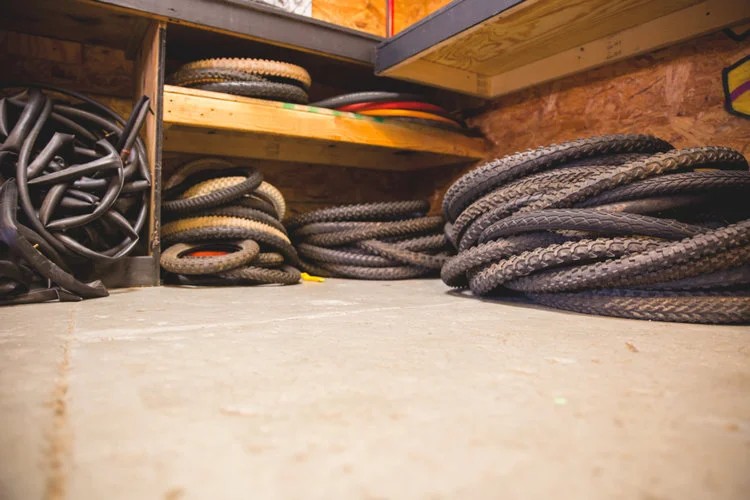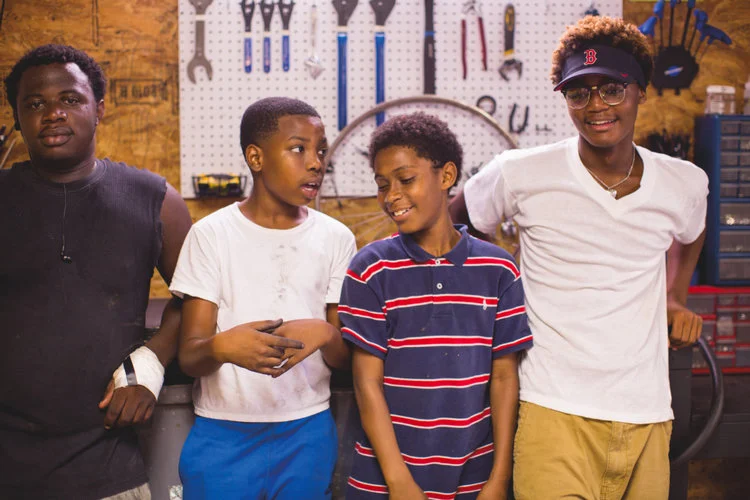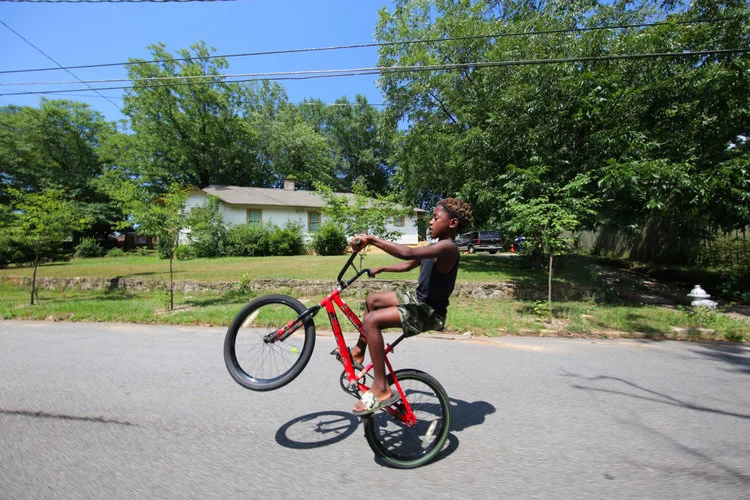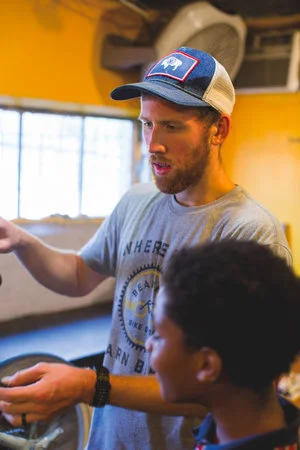Building Connections
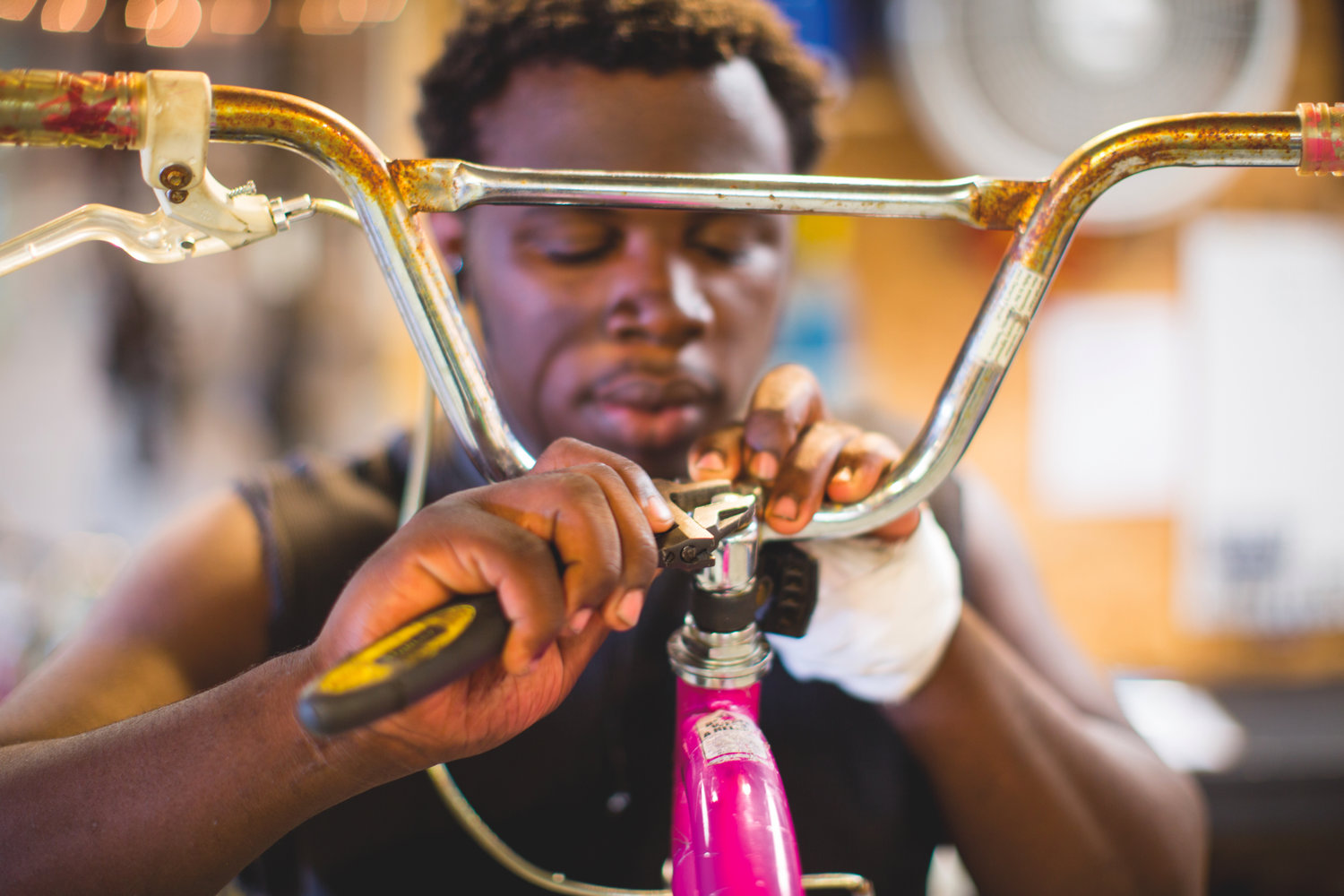
THE RAIN HAS CLEARED. THE WORKSHOP IS NOW OPEN AND HUMMING WITH ENERGY. KIDS EXCITEDLY CLAMOR ABOUT, TOOLS CLANKING. BIKES ARE ON RACKS GETTING WORKED ON. INNER TUBES AND TIRES RESIDE IN A CORNER.
ABOVE: A pile of spare tires freshly stripped off of old bikes.
We’re inside Bearings Bike Shop in Adair Park, a neighborhood in southwest Atlanta nestled beside elevated MARTA tracks. This area saw one of the highest foreclosure rates in the city of Atlanta when the giant real estate bubble burst.
It was around that time that Becky and Tim O’Mara, founders of the bike shop, relocated here. Wanting to move from the suburbs into the city, they saw an affordable, “great little neighborhood, really diverse,” Becky says. “We loved the houses and the community that was here, so we bought a house and started renovating.” It was 2008. Bikes were nowhere on their mind.
ABOVE: Jquare Smith, 16, Justin Carter, 13, Tremain Gary, 11, and Jadin Lewis, 15, hang out at the shop on Saturdays.
With their new home just across the street from a neighborhood park, what they got was a front-row seat to life in Adair Park, unvarnished. “We’d sit on our porch and watch teenagers get high in the gazebo and little kids fight, like little kids get into fist fights with each other,” Becky says. “It was just crazy to watch. So we kind of realized, ‘Oh, okay, that’s what’s going on here.’
“When we moved into the area, we wrestled through it a lot. We just had never known that there was this poverty that existed in our city, so close to us,” she says. “We were living in the suburbs and were used to driving past these neighborhoods to get on a plane and go on a mission trip somewhere else.”
THE NEW NEIGHBORS || Trash used to line these streets. That was before the O’Maras became more and more enmeshed in the community. As fights unfolded between little ones, Becky and Tim would grab their dog and go for a walk, “you know, to try and distract” and break up fights, explains Becky. They slowly got to know the kids, their names. The kids learned theirs.
Soon, thanks to one outgoing girl named Britney, the idea for the bike shop was born. She came by their house looking for glue to complete a homework project. The O’Maras helped out and started a friendship. One day, they realized that Britney, one of the few kids in the neighborhood who had a bike, hadn’t been riding hers lately. The tires were busted, so they struck a deal. Britney agreed to do some chores around the O’Maras’ house to earn the cost of the replacement parts and, in exchange, they would buy them for her and work with her to fix up her bike. A new bike turned out to be
ABOVE: Becky O’Mara says bikes give kids independence.
“WE JUST HAD NEVER KNOWN THAT THERE WAS THIS POVERTY THAT EXISTED IN OUR CITY, SO CLOSE TO US. WE WERE USED TO DRIVING PAST THESE NEIGHBORHOODS TO GET ON A PLANE AND GO ON A MISSION TRIP SOMEWHERE ELSE. ”
within five dollars of the replacement parts, so after about a month, Britney got one. “She was over-the-moon excited,” Becky explains. But it wasn’t just Britney. “It felt like instantly there was a knock on the door and it was her and other kids in the neighborhood who were like, ‘We want bikes too!’ ”
The O’Maras started thinking and talking to friends. “‘If you have a bike you’re not using anymore, we’d like to take it,’ ” she says she told them. “And sure enough, people had bikes.” They got two or three bikes here and there. One lady had seven bikes that she couldn’t bear to sell or throw out. It was a win for the O’Maras and the neighborhood kids.
“The trade became, if you’ll pick up six bags of trash in the neighborhood you’ll get a bike,” Becky says. At the time, litter was such an issue, kids hardly had to go a block and they could fill their bags. Soon, the neighborhood started to look different. It felt different too.
ABOVE: Derrick McLemore, 10, practices “walking” his bike.
“As that started to happen, people’s perception of the kids started to change,” Becky says. That was a big deal, she explains, because they were often thought of as threats. Several homes had been broken into by teens. But the cleanup began changing perceptions. “The kids weren’t anonymous anymore, first of all, and all of a sudden the kids were contributing and making the neighborhood a different place.”
Soon the O’Maras were introducing other adult neighbors to the kids. In turn, they’d hire the kids to complete odd jobs around their houses.
“It was this incredible strengthening of the community,” she says. The kids got a better reputation and so did newcomers to Adair Park. Prior to the kids partnering with new neighbors, Becky says, the mistrust ran both ways. “The young professionals moving in, were seen as, you know, ‘What are you doing in my neighborhood?’ The bikes completely changed that.”
EARNING A BIKE || Now there’s a point system at the shop that keeps everything running. Ten points earns you your first bike and a lock. You earn one point for each hour worked at the shop rehabbing donated bikes. The more hours kids rack up, the more perks they earn. As they achieve different levels, they earn new privileges, such as working with more sophisticated tools. They can trick out their bikes with upgrades and they get a different color shirt, almost like a martial arts belt, every time they advance. They can earn other bikes for siblings or friends too.
The O’Maras say they wanted to empower the kids to be able to fix their bikes themselves and take pride in working hard and earning something. It’s about dignity, not charity.
ABOVE: Volunteer Taylor Vaughan works with Tremain Gary, 11.
“For us, it was an expression of our love for God, love for people,” Becky explains. She says it was their way to fill what they saw as the biggest need for some of the neighborhood kids — more positive influences in their lives.
When hanging out at the shop, you wouldn’t notice that it is a part of something bigger. The only exception might be the sign at the front door that reads, “God forgives. The streets don’t.” But that’s all good, says Becky. The bikes have resonated with the community and have helped them to build relationships through which they can share God’s love one-on-one, either through conversations or just being a friend when a crisis comes up, she says.
In the shop, under the clear Christmas lights and with profanity-free rap thumping in the background, you can see the kids’ confidence building. Travonus Monfort, 19, grew up in the shop. Now that she’s older, she serves as the shop’s intern — checking emails, making deposits and entering data. A student at Valdosta State University, she pays her way, in part, from jobs she’s been connected to through the shop. She says she’s thankful for the role Bearings has played in her life.
“It’s just taught me the importance of taking on challenges and overcoming those challenges. Because in the beginning, learning to fix bikes — it’s not easy because you don’t know what you’re doing. You have to learn,” she says. “It’s ‘keep trying and you’ll get it.’ It’s learning persistence, and learning the responsibility of fixing your bike… . It just teaches me all these different values and things that are important in life.”
WANT TO PITCH IN?
There are now three shops around Atlanta.
— Adair Park
— Westview
— English Avenue
Bearings Bike Shop accepts donations of
old bikes and sells refurbished bikes.
Check out bearingsbikeshop.org for more information.

